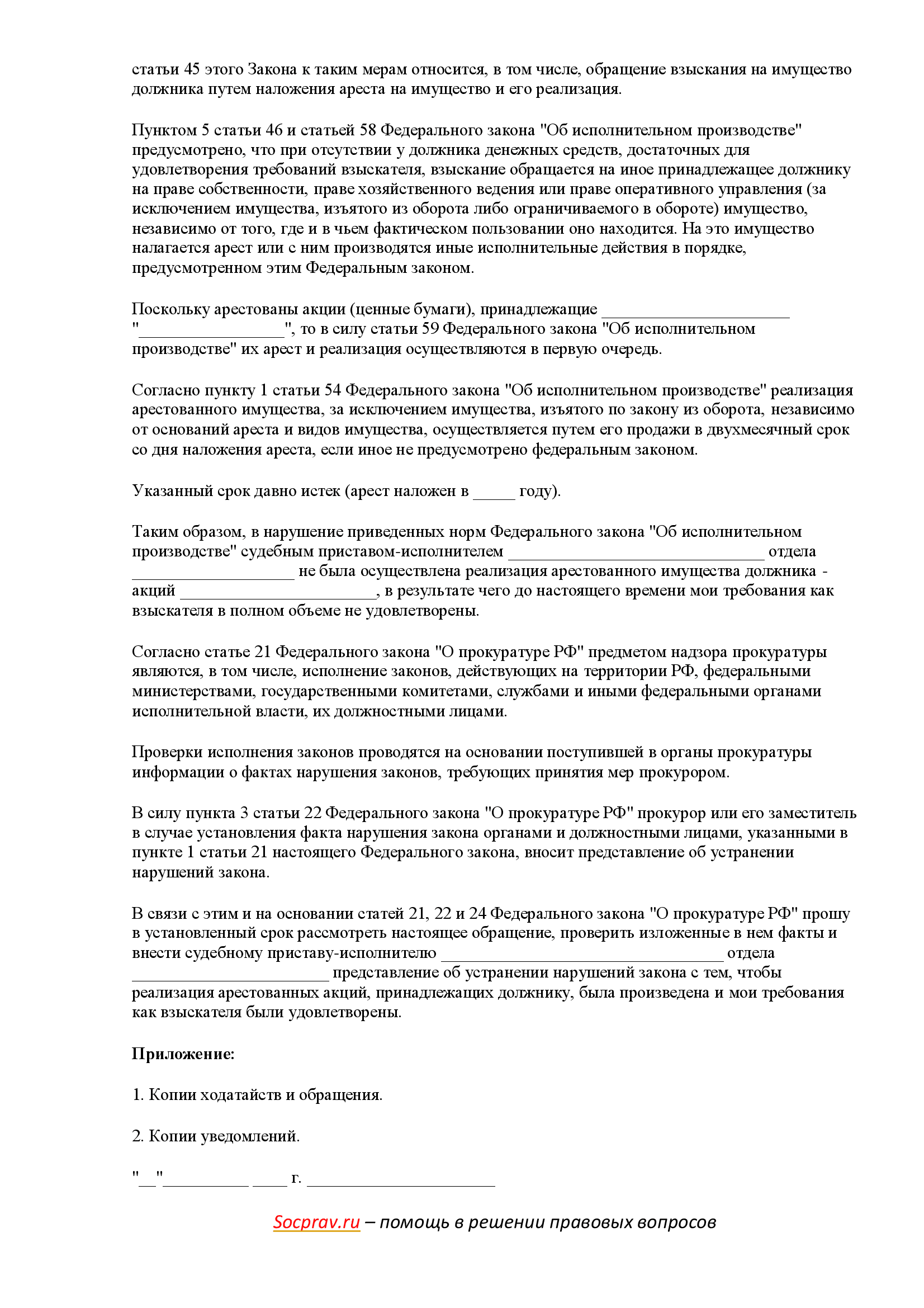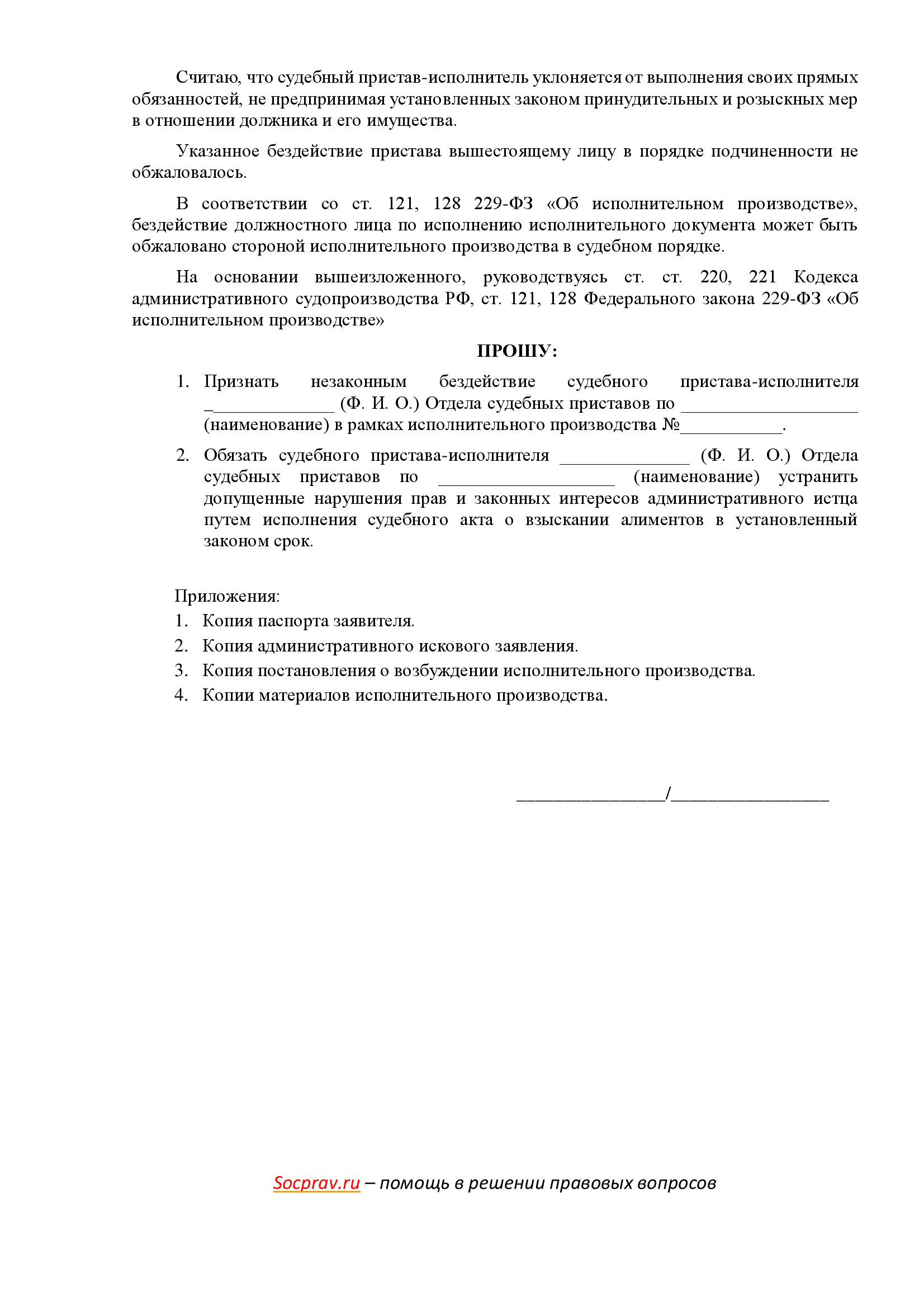Responsibilities of bailiffs for the collection of alimony
The duties of bailiffs are reflected in paragraph 1 of Art. 12 Federal Law No. 118-FZ. If the bailiff does not comply with them, the interested person can contact the senior bailiff or other regulatory authorities with a complaint. Violation means any unlawful action of the bailiff, as well as his inaction when collecting alimony, including cases of sending “unsubscribes” without actual actions to satisfy the demands of the collector.
The duties of bailiffs include:
- control over the execution of enforcement documents, including all cases of collection of debts and obligations;
- making all case materials freely available to the claimant, debtor or their representatives;
- consideration of requests from parties directly related to the execution of a court decision or other document for the recovery of funds for child support;
- registration of self-recusal if the bailiff has a personal interest in resolving the case;
- processing of data of parties and third parties, if this information is required for the execution of a writ of execution in full or in part, including personal data of the child, guardians and (or) each parent;
- placing a debtor or other interested person on a national or interstate wanted list if for any reason he evades paying alimony;
- conducting administrative proceedings;
- sending a notification to the senior bailiff about the commission of a crime by one of the parties.
Improper performance by a bailiff of his duties leads to disciplinary or other sanctions, in accordance with the form of the violation. An interested person has the right to contact either one of the authorities or all authorized authorities at once.
Complete the survey and a lawyer will share a plan of action for alimony in your case for free.
You might find it useful:
Child support calculator
Penalty calculator
Samples of documents on alimony
Legal advice on alimony
General design requirements
How to write a complaint against a bailiff for alimony? To file a complaint with the head of the FSSP department, it is better for a woman to find out the office hours in order to personally meet with the head of the body. The paper will need to be written in legible handwriting. You can print the appeal using a computer. To avoid refusal to accept a document, you need to know what information it should contain. The text includes:
- full name of the institution;
- personal data of the applicant, his contact phone number;
- information about the bailiff who initiated enforcement proceedings;
- date of filing the initial application, existence of grounds for receiving alimony;
- signs indicating the employee’s inaction, available evidence;
- requirement to take urgent measures (to recover money, to punish the perpetrators);
- applicant's signature, date.
Rice. 1 – Complaint about the inaction of the bailiff (sample)
Grounds for complaints against bailiffs
The debtor or collector has the right to appeal any actions or inactions of the bailiff if they are not satisfied with the results of his work. The response document to the complaint contains explanations regarding the satisfaction of the complaint or refusal to satisfy it.
The grounds for filing complaints against the bailiff include:
- Actions of a bailiff aimed at concealing information about a debtor or collector.
- Inaction of the bailiff in debt collection, including in the case of alimony collection, including situations where the bailiff is not actually involved in enforcement proceedings, but sends formal replies to the collector.
- Transferring the case to the archives without any explanation or debt collection.
- Incorrect calculation of debt, including cases of increase or decrease in the amount of debt. Moreover, when collecting a debt, bailiffs charge an enforcement fee of 7% of the debt amount, so debtors need to take this figure into account.
- The bailiff refuses to search for the debtor if it is not possible to find him by other means.
- Other actions or inactions that violate the rights of the claimant or debtor during enforcement proceedings.
The complaint is drawn up in accordance with the provisions of procedural legislation and submitted to higher authorities for consideration on its merits. The applicant has the right to draw the attention of inspectors to any violations in the work of the bailiff, therefore, when drawing up a document, several reasons for the application can be indicated.
Complaint or challenge
To influence the bailiff, who for various reasons is not involved in monitoring the execution of enforcement documents for the collection of alimony, there is a procedure for filing a complaint and challenge.
| Distinctive features of the complaint and challenge | ||
| Characteristic | Complaint | Retraction |
| Concept | A written request from an interested party to authorized government bodies (usually higher ones) regarding the elimination of a violation of the rights and legitimate interests of the applicant. | Removal of a participant in enforcement proceedings (bailiff) from conducting a case and monitoring its execution, due to personal interest in the results of enforcement proceedings, in cases where the bailiff himself, or his relatives or close friends are claimants or debtors. |
| Reasons for filing | Direct violation of the duties of the bailiff, or inaction regarding the execution of the writ of execution. | The bailiff's interest in considering the enforcement case, including cases where the bailiff is a relative of the claimant or debtor, his friend, or is himself a claimant or debtor. |
| Regulation in basic legislative acts | Clause 1 Art. 12 Federal Law No. 118-FZ, art. 123 Federal Law No. 229-FZ dated October 2, 2007 | Art. 63 Federal Law No. 229-FZ of October 2, 2007 |
| Deadlines for applying | 10 days from the moment the applicant learned of the violation of his rights | An application to disqualify a bailiff is submitted before the commencement of enforcement actions. |
According to paragraph 2 of Art. 63 Federal Law No. 229-FZ, the bailiff, if there are grounds for recusal, is obliged to declare self-recusal. Regardless of the reasons, if the bailiff has not submitted documents for self-recusal, the interested party - the collector, the debtor or any of their representatives has the right to apply to a higher authority with an application to challenge the bailiff.
Obtaining a certificate of alimony debt from bailiffs
How to resume enforcement proceedings for alimony?
Complaint against the bailiff to the prosecutor's office
This move will be more effective compared to the option discussed above, because one of the functions of the prosecutor’s office is to consider cases related to the failure of employees to fulfill their duties, including bailiffs.
To apply, you need to draw up an application, which is in many ways similar to an appeal to the management of the bailiff, but also has a number of differences. In particular, it will be necessary to indicate the legislative norms by which a citizen has the right to such treatment.
As a sample of such a complaint, use the following diagram:
- at the top of the application on the right, indicate to which body the appeal was sent - the choice of the prosecutor’s office depends on the location of the bailiff’s office, because the territorial principle works here;
- Please indicate your details below (full name, registration and residence address);
- reveal the essence of the case in the main part of the document, for which indicate the case number and the body that made the decision; provide information about the bailiff - his name and surname, since what period the employee has been inactive and does not perform the functions specified in the law; at the same time, it is necessary to indicate the regulatory legal acts that establish the rights of citizens to appeal, and also spell out the duties of bailiffs to collect alimony;
- the petition is written in paragraphs and is formulated as clearly as possible: indicate a request for the prosecutor to check a specific bailiff and bring him to justice if violations are discovered;
- At the bottom of the complaint against the bailiff, indicate the date it was written and secure it with a signature.
Deadlines for appealing the actions of bailiffs
Art. 122 Federal Law No. 229-FZ establishes that the period for filing a complaint is ten days from the moment when the right of the claimant or debtor was violated. If the interested person is not informed about the date and time of the actions, this period is counted from the date when he became aware of them.
The filing of a complaint is carried out in the order of subordination in accordance with the provisions of paragraph 1 of Art. 123 Federal Law No. 229-FZ:
Reporting order
Are you tired of reading? We’ll tell you over the phone and answer your questions.
Application deadlines
A citizen has the right to file a complaint about the lack of enforcement measures within 10 days from the moment he became aware of it. This period is very conditional since only the bailiff himself can name a specific date for the start of inactivity.
In some cases, the fact of inaction can still be marked by a temporary period. For example, when an official makes an illegal decision to refuse to familiarize himself with documents of enforcement proceedings or to sell the property of an alimony payer without giving him the opportunity to pay off the debt voluntarily.
Under these circumstances, a claim for the bailiff’s inaction in collecting alimony is filed within 10 days.
Video on the topic: bailiffs do not want to work.
Where to complain about bailiffs regarding alimony
A complaint about the inaction of the bailiff in cases of collection of alimony can be filed by collectors, debtors or their representatives. If the complaint is filed by a representative, a power of attorney will be required.
Collectors can be various categories of citizens and officials:
- guardianship and trusteeship authorities, if the debtor is obliged to pay alimony for a dependent under the care of the state;
- one of the parents with whom the child lives;
- a former spouse who is on parental leave until the child reaches three years of age, as well as in case of disability during the marriage;
- the parents of the debtor, if the court has established an obligation to pay alimony to support them;
- guardians of dependents, including incapacitated adults and minor children of the debtor.
The document is drawn up in writing and must contain complete information about the FSSP employee, his activities and violations.
The law allows filing a complaint:
- to the senior bailiff, who must familiarize himself with the materials and the case and make a decision based on his decision;
- to the prosecutor's office;
- to court.
The applicant has the right to file a complaint with all authorities, but the most consistent option would be to contact them in turn:
- Senior Bailiff.
- Prosecutor's office.
- Court.
In this case, there will be no need to visit different government agencies several times in a row on the same issue if, for example, the senior bailiff takes the applicant’s side. At the same time, appealing to a senior bailiff has its positive and negative sides: such a complaint is considered within ten days from the date of filing, but the decision of the senior bailiff can be appealed to higher authorities. Consideration of a complaint in court can last for several months, which can negatively affect debt collection in general.
Senior bailiff
An appeal to the leadership of the regional department of the FSSP is the first step in appealing against the actions or inactions of the bailiff. At the same time, the senior bailiff has the right to request materials from the enforcement proceedings for study and decision-making.
The applicant must follow the following procedure when contacting the senior bailiff:
- Contact the bailiff and disagree with his inaction, try to talk to him and discuss the situation. Theoretically, a dissenting citizen may not contact the bailiff, but in this way one can learn about the bailiff’s motivation and the reasons for making an inappropriate decision or inaction.
- File a complaint.
- Attach documents confirming the bailiff's inaction, for example, documents confirming the illegal closure of enforcement proceedings.
- Send a complaint by mail to the senior bailiff, or send an electronic complaint on the FSSP website, or bring it in person and hand it over at a meeting with the senior bailiff.
After filing a complaint, the senior bailiff has ten days to consider it, make a decision and implement it. If the complaint is satisfied, the bailiff may be subject to disciplinary action.
To the prosecutor's office
According to the provisions of Section III of Federal Law No. 2202-1 of January 17, 1997, the prosecutor's office has the right to conduct an inspection regarding compliance with the rights and legitimate interests of citizens, including compliance with their rights when conducting enforcement proceedings for the collection of alimony. The complaint will be considered if it is drawn up by a participant in the proceedings or his representative.
General procedure for contacting the prosecutor's office:
- Drawing up a complaint in accordance with the established regulations.
- Collection of necessary documents. The item is optional, however, in the absence of documents, the interpretation of the complaint may be distorted, or the period for its consideration will increase, since the prosecutor’s office will need to request materials from the enforcement case.
- Filing a complaint through the online reception of the prosecutor's office, or sending a complaint by mail to the prosecutor, or providing documents during a personal meeting with the prosecutor.
- Receipt of verification results after the expiration of the ten-day period.
The prosecutor has the right not only to check the actions of the bailiff, but also to initiate an internal audit against him, as well as to petition for the prosecution of the responsible bailiff with disciplinary, administrative or criminal liability.

Sample complaint
Consultation on document preparation
To court
The courts of the Russian Federation are not vested with the right to consider complaints, however, an interested person has the right to appeal against decisions, actions or inactions of a bailiff in cases of collecting alimony in court. You need to draw up a statement of claim to declare the actions or inaction of the bailiff illegal, justify the violation of your rights and legitimate interests, and also collect the necessary package of evidence.
The case is being considered within the framework of administrative proceedings. How it all looks step by step:
- Receiving from the bailiff an explanation, resolution, “unsubscribe” and other documents that indicate a violation of the rights of the interested party.
- Drawing up a statement of claim in accordance with the provisions of Art. 131 Code of Civil Procedure of the Russian Federation.
- Collection of additional documents.
- Filing an application to the court.
- Participation in a court hearing and asserting your rights, or participation of a representative.
- Obtaining a court decision and presenting it to the regional department of the FSSP.
The initial consideration of the application is carried out within ten days, after which the applicant and other interested parties are notified of the date and time of the court hearing. At the same time, the total period for consideration of a claim, taking into account court proceedings, averages from one month to six months.
Appeal to the court is required only in situations where the applicant has suffered significant material damage due to the actions (inaction) of the bailiff, including incorrect calculation of alimony arrears, illegal collection of penalties and fines, etc.
As practice shows, it is better to immediately go to court to appeal the bailiff’s actions. Attempts to peacefully resolve the problem are not always effective.
Snezhana Pogontseva
Lawyer, author-editor of the website (Family law, 12 years of experience)

Sample claim
Consultation on document preparation
Where to complain about the inaction of the bailiff in collecting alimony
In order to record the fact of the bailiff’s inaction, the participant in the process of alimony payments who witnessed it must file a corresponding complaint.
The legislation provides for the existence of several entities to which an application can be submitted with a complaint about the inaction of the bailiff:
- participants in the process can contact the head of the territorial department or the head of the bailiff body;
- a complaint can be filed with the prosecutor's office;
- recourse to court is provided.
You can also contact the bailiff himself, who has no right to refuse to provide written explanations of his actions to monitor alimony payments. As a rule, such an event is not very effective: the performer claims that he is taking all the required measures, and the matter does not move forward. However, lawyers advise starting from this stage, because the presence of written explanations from the bailiff will further confirm the fact of his violation of his duties.
It is worth emphasizing that both the alimony recipient and the payer have the right to demand explanations in writing. This does not require permission from the management of the bailiffs - such a right of participants in the alimony payment process is very clearly stated in the legislation.
If such actions do not bring results, and the inaction of the bailiff continues, you should file a complaint against the bailiff to his superiors, the prosecutor's office or the court authority. In each case, the procedure and sample document are different, so it is worth considering them in more detail.
Contents and sample of a complaint about the inaction of bailiffs
The senior bailiff or other official who is considering the complaint has the right to reject the document if it does not comply with the provisions of Art. 124 Federal Law No. 229-FZ. If a claim is filed in court, then the provisions of Art. 131 of the Code of Civil Procedure of the Russian Federation. These differences must be taken into account.
Art. 124 Federal Law No. 229-FZ establishes that the complaint must reflect the following data:
- full name of the government agency to which the document is sent;
- Full name of the bailiff against whom the complaint is being filed;
- Full name, telephone number and residential address of the applicant;
- a full description of the situation and the fact of violation of the rights of a citizen, including links to regulations and attached documents;
- the purpose of drawing up a complaint indicating the requirements;
- an instruction to provide a written response if the applicant requires one;
- date of document preparation and signature of the applicant.
The complainant is required to make a copy of the complaint. The copy is marked with acceptance of the document for consideration when the applicant applies to the authorized bodies. From the moment the acceptance mark is marked, the calculation of the terms for consideration of the application begins.
Consultation on document preparation
Complaint about the inaction of the bailiff to the manager
This method is the simplest, but does not always lead to the expected results. Often the proceedings end with just a conversation with a specific bailiff, but the case does not move forward.
Filing a complaint about the inaction of a bailiff takes the form of an application. There are no specific forms for such documents, but there is a certain list of requirements for the content. That is why you should study a sample of such a statement or familiarize yourself with how to draw it up.
The format does not differ from the standard one: in the upper right corner they indicate to whom the application was sent (this is, as a rule, a senior bailiff) - position, name and surname. Next they write from whom such a complaint is coming. It is worth indicating not only your full name, but also your address.
The body of the statement itself describes the essence of the issue:
- the number of the court decision and the name of the authority that issued it are indicated;
- enter the data of the bailiff dealing with the issue of monitoring alimony payments;
- the reason for the complaint is stated: the fact of the violation is indicated (in particular, the inaction of the bailiff, his excess of authority), the failure to fulfill the duty is briefly outlined;
- the request is indicated - in the form of a request to take appropriate measures.
The date of submission of the application is indicated and a signature is placed. Such a complaint about the inaction of the bailiff is submitted through the office or directly to the manager. It can also be sent by mail (indicate the address, name of the authority, full name of the senior bailiff).
The recipient does not have the right to leave the application for the bailiff’s inaction unattended and is obliged to demand from the subordinate a report on the actions and an explanation of the facts specified in the application.
If a complaint about the bailiff’s inaction to the authorities does not bring results, it is worth contacting other authorities, for example, the prosecutor’s office.
List of attached documents
When going to court, you will need an administrative statement of claim, a passport and the disputed decision (copy). The same is needed for a superior manager or the prosecutor's office, but instead of an application, a complaint is filed.
We also need evidence confirming that the appeal is well founded:
- copies of the bailiff's decisions, with the content of which the applicant does not agree;
- “formal replies” from the bailiff about the progress of the case, if the collection of alimony is not actually carried out;
- copies of enforcement proceedings;
- statements from the applicant’s accounts indicating that no funds were received;
- refusal to consider the complaint by a senior bailiff;
- other documents related to the complaint.
If the official reviewing the complaint needs to request additional documents, the review period may be extended. When the case materials are requested, enforcement proceedings are suspended until the authorized person makes a decision on the results of the inspection.
Answers from lawyers (7)
In accordance with Article 122 of the Law of the Russian Federation “On Enforcement Proceedings,” a complaint is filed within 10 days from the date of establishing the fact of the bailiff’s inaction. A complaint can be filed in the order of subordination to the senior bailiff of the unit in which the bailiff whose actions are being appealed serves, or to the court of the district in which the bailiff unit is located.
The complaint must specify the actions or inactions of the bailiff that are being appealed, as well as the demands put forward by the complainant.
A complaint filed in the order of subordination is subject to consideration within 10 days from the date of its receipt.
Unfortunately, it seems to me impossible to provide a sample application, because this kind of application is unique and is written individually.
27 June 2013, 10:59
Home » Bailiffs for alimony » Complaint about the inaction of the bailiff alimony sample
Arbitrage practice
People turn to the courts quite often, but their demands to recognize bailiffs' decisions as illegal are not always satisfied.
Here are some examples of real solutions:
- The man went to court to recognize the decision on the calculation of alimony arrears as illegal and to cancel it. By decision No. 2A-5506/2019 2A-5506/2019~M-4904/2019 M-4904/2019 dated December 5, 2019 in case No. 2A-5506/2019, the claims were denied.
- The plaintiff wanted to recognize the bailiff’s decision as illegal, but the court did not agree with the demands and refused to satisfy them (Decision dated September 2, 2011).
- The man tried to challenge the bailiff’s decision, the court sided with the FSSP (Decision No. 2A-1183/2019 2A-1183/2019~M-1076/2019 M-1076/2019 dated September 13, 2021 in case No. 2A-1183/2019).
Functions of a bailiff
To collect alimony assistance, the bailiff is entrusted with a number of powers. After the court’s decision is made, it is sent to the territorial branch of the bailiff authority. A responsible bailiff is appointed there, who is obliged to begin performing the functions assigned to him within two months. The main ones are as follows:
- collection of information about the parties (including certificates, personal information, explanatory notes);
- checking documentation from the place of work of the alimony payer;
- instructions to the parties regarding the performance of their duties in the case;
- obtaining access to the property of the alimony payer, in particular to real estate owned by him; if necessary, the bailiff has the right to open them;
- arrest of certain types of property of the debtor (the list is regulated by law);
- seizure of bank deposits according to an executive decision;
- putting the debtor on the wanted list if he fails to fulfill his obligations;
- searching for a minor for whom alimony is paid;
- calling the parties to provide explanations;
- verification of documents that confirm identity - for both parties;
- cooperation with government authorities: guardianship authorities, internal affairs bodies, prosecutor's office.
If the bailiff does not fully understand the court decisions, he should contact the body that considered the case and receive additional clarification.
Bailiffs have other obligations, but it is those listed above that most often become the object of a complaint. Excess of authority, incomplete performance of functions or inaction of the bailiff are grounds for writing a corresponding statement both by the person in whose favor alimony is assigned and by the payer himself.
The range of responsibilities that fall within the purview of a bailiff is wide. As part of the debt collection procedure, including alimony, FSSP employees assume supervisory functions. Moreover, the responsible person from among them must begin to perform his duties within 8 weeks. Main functions of bailiffs:
- interact with other government bodies (if necessary);
- demand documents that certify the identities of the parties (the alimony payer/debtor and the person in whose favor the debt is being collected), as well as verify their authenticity;
- if necessary, to obtain substantive explanations, call the payer or recipient;
- when the payer evades fulfilling his obligations, put him on the wanted list;
- take measures to establish the location of the minor for whose maintenance funds (alimony) are being collected;
- contact the authorities that issued the document for clarification in cases where the decision is not entirely clear or allows for contradictory interpretations;
- seize the payer's bank deposits in the amount corresponding to that specified in the executive document;
- when the payer has accumulated a significant debt, seize certain types of property (legislation allows for the seizure of a number of types of property);
- gain full access to buildings, structures, and other premises owned by the alimony payer (when the premises are the property of a third party, but play a significant role in the case, then similar rights arise if there is an appropriate decision of the authorized body);
- provide the parties with explanations and instructions regarding the procedure for fulfilling their duties;
- check the executive documentation at the place where the payer works;
- obtain the required information about the parties (including personal data).
Lawyer's answers to private questions
Who is the defendant in the case of appealing the bailiff's decision?
The administrative defendant is the FSSP department, which issued the contested decision.
Is it possible to write a complaint about the bailiff’s inaction online?
Yes. To do this, a personal account on the website of the regional FSSP is enough. To log in, you can use your State Services account.
What is better: a complaint to the senior bailiff about the alimony order, or to immediately go to court?
It is more effective to file an administrative claim. But even this does not give any guarantee that the document will be cancelled.
Is it necessary to file a complaint with the senior bailiff before going to court?
No. In this case, it is not necessary to follow the pre-trial dispute resolution procedure.
Is it possible to write a complaint against the bailiff for alimony and send it by mail?
Yes. The same applies to the statement of claim. But it is better to send documents by registered mail with acknowledgment of receipt and inventory.
What should I do if the bailiff violates my rights, and the court refused to recognize his actions as illegal?
In such a situation, you can file an appeal against the decision before it comes into force. This is done within one month from the date of acceptance in final form.
In what situations is a complaint filed about the inaction of the bailiff regarding alimony?
It should be noted that the FSSP is obliged not to infringe on the rights of the claimant through inaction. By the way, it comes in two types.
Factual. If the service does not take any measures to find the alimony defaulter.
Procedural. Here we are talking about failure to meet deadlines for preparing and reviewing documents.
In such cases, a complaint is drawn up about the inaction of the bailiff regarding alimony. It is necessary to indicate why you think that the FSSP employee is not doing anything or how this is expressed. The most common options from practice:
- delay in the collection of alimony;
- they refuse to provide production materials when you want to monitor the work of the bailiffs;
- put the defaulter's property up for sale when he already voluntarily wants to pay off the debt.






